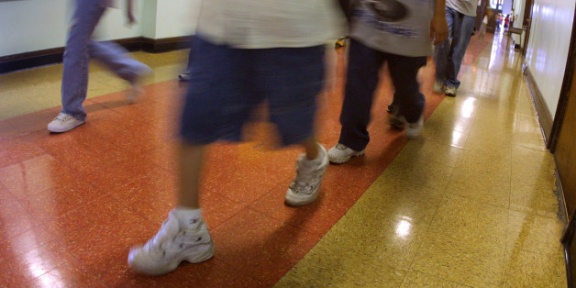By: Ashmar Mandou
 A legislative committee has passed a bill that would give CTU members the right to bargain over non-salary conditions, from crowded classes to filthy schools. CTU Vice President Jesse Sharkey joined public school allies to testify Tuesday in support of the bill. “In 1995, Chicago’s mayor and the state legislature robbed the CTU of the right to stand up for our students,” said Sharkey. “The results have been dismal: overcrowded classrooms, ten years of failure to pay into teachers’ pensions, an explosion of costly and failed privatization, filthy schools, deep budget cuts, the shortchanging of special education, excessive testing and a host of other management policies that undermine students and teachers. Today, the legislature moved to overturn this failed experiment and give back our right to fight for the needs and dignity of our students.”
A legislative committee has passed a bill that would give CTU members the right to bargain over non-salary conditions, from crowded classes to filthy schools. CTU Vice President Jesse Sharkey joined public school allies to testify Tuesday in support of the bill. “In 1995, Chicago’s mayor and the state legislature robbed the CTU of the right to stand up for our students,” said Sharkey. “The results have been dismal: overcrowded classrooms, ten years of failure to pay into teachers’ pensions, an explosion of costly and failed privatization, filthy schools, deep budget cuts, the shortchanging of special education, excessive testing and a host of other management policies that undermine students and teachers. Today, the legislature moved to overturn this failed experiment and give back our right to fight for the needs and dignity of our students.”
The Illinois House Labor & Commerce Committee passed HB 4776 by a margin of 17 to 12. The bill, which now moves to the full House, strikes Section 4.5 of the Illinois Education Labor Relations Act, which bans the CTU’s ability to bargain—and potentially strike—over non-monetary issues, a right denied to only to teachers in Chicago. The change would give the CTU the power to challenge classroom conditions that negatively impact students and teachers, from overcrowded classrooms to filthy, poorly maintained schools that create health hazards for students and staff. The legislative action is timely, says the CTU, in the wake of a series of CPS scandals on filthy public schools. The fault, argues the CTU, does not lie with union janitors, whose ranks have been slashed since Chicago Mayor Rahm Emanuel privatized maintenance services in 2012. Yet Section 4.5 effectively banned the CTU from challenging those conditions through collective bargaining.
“Section 4.5’s restrictions on collective bargaining have meant that, for decades, we’ve been hamstrung from forcing CPS to remedy critical problems—including deplorable conditions in our schools that can be directly tied to Emanuel’s failed $800 million privatization of facilities maintenance. Today, hundreds of schools are plagued with rodent and insect infestations, crumbling facilities, exposed asbestos-laden floor and ceiling tiles, and thousands of water sources that have never been tested for lead or other health risks,” Sharkey said. “We urge the full House to follow the lead of the Committee, pass this bill, and return to our members the power to directly challenge this dangerous failure of leadership.”
Legislators are currently considering four other CTU-supported bills that directly impact conditions in public schools: HB 5481, requiring school districts to report class size data to ISBE and sets targets for K-12 class sizes beginning in 2020; HB5721, which mandates improved public input and transparency in CPS capital spending and provides supports for schools and students hit with school actions like closings and turnarounds; HB 3786, which requires fully empowered local school councils in publicly funded schools, including charters, that must vote by a super-majority to approve school closures and reorganizations; and HB 4800, which would move surplus TIF funds to public education needs.









